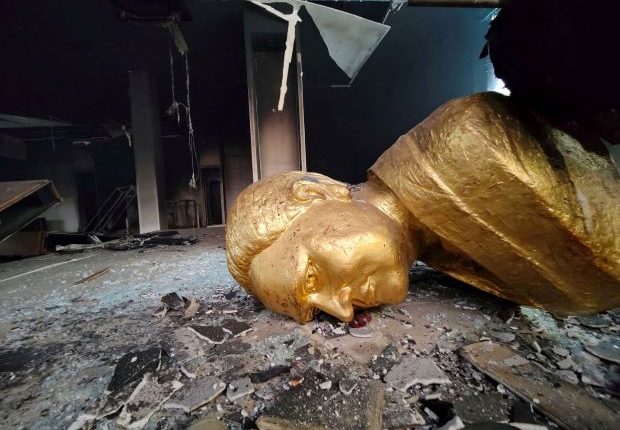Rajapaksa pocket boroughs are in bad shape too
By Ruth Pollard
The road to Hambantota may be paved with Chinese money, but its value is up for debate.
Set among the paddy fields and coconut palms of Sri Lanka’s Deep South, the place is best known as the stronghold of the Rajapaksa clan, who have spent years using borrowed money to build monuments to themselves. The little-used Mattala Rajapaksa International Airport, the often overgrown Mahinda Rajapaksa Stadium, and a memorial to the Rajapaksa elders that was burned and destroyed by a furious crowd of protesters on May 9 are testament to that terrible waste.
A statue of D.A. Rakapaksa, a former Member of Parliament and father of President Gotabaya Rajapaksa and the recently resigned prime minister, Mahinda, was also targeted. It now lies on the ground, covered in tattered tarpaulin.
The clocktower of their home town of Weeraketiya has been vandalized, ‘Gota Go Home’ spray-painted on it.
Once, it was unimaginable to see this sentiment expressed in the Rajapaksa heartland. While some locals say infrastructure projects created jobs, others vow they will no longer stand for what they see as such obvious misuse of public funds.
Less than 10km away, local farmers and traders prepare for the worst. The president’s decision to flick the switch to organic farming overnight by banning chemical fertilizer imports in May 2021 caught everyone by surprise and harmed the agriculture sector. The ban was lifted six months later, but by then, the damage was done—yields were decimated and Sri Lanka had plunged into a food and foreign reserve crisis that ended in its default on May 19, 2022.
“He destroyed his own village with that decision,” says cinnamon farmer and local opposition politician, Anura Vidana Arichi, gesturing to rice paddies. “These fields have been cultivated for decades—yields have fallen more than 50% this season and we have abandoned farming for now. Next season only 10% will be planted, and even then we don’t know what will grow without fertilizer.”
As inflation neared 40% last week, the government urged farmers to plant rice. This attempt to stave off an ever deeper food crisis will likely have little effect; there is no money to import fertilizer and without it, the crops just won’t produce anything close to what’s needed to feed the island’s 22 million people.
Prime Minister Ranil Wickremesinghe has warned of an acute food shortage by September, while the president has asked officials to stockpile essentials.
The South Asian nation needs as much as $4 billion to see it through its worst economic crisis since it independence in 1948. Negotiations are on with the International Monetary Fund (IMF) and key bilateral creditors, China, Japan and India, but it is going to take a lot to unpick its tens of billions in foreign debt and the tangled web of capital market borrowings and Chinese loans for unprofitable infrastructure projects.
The Rajapaksa government’s decision in 2019 to cut taxes, especially for the wealthy and corporations, led to annual revenue losses of $2.2 billion. The new regime is looking to reverse that decision in order to meet IMF bailout conditions.
In Colombo, doctors and lawyers have joined together in an unprecedented push to convince the government to undertake real reform. An urgent letter sent to the nation’s diplomatic community in April that flagged alarming shortages in the medical supply chain of 273 critical items prompted swift action from embassies and high commissions. Some drug donations arrived and stocks of anaesthesia were temporarily replenished, but most elective surgery has been cancelled due to the crisis.
Popular anger remains palpable. People have seen politicians’ mansions and luxury cars and all those wasted billions, and now they are feeling the pain of default in every aspect of their lives.
A court case, in which the president was indicted over the misappropriation of about $91,000 in public funds to build a museum to his parents, was dropped soon after his election in November 2019. There are other serious allegations against the Rajapaksa family and their associates, including money laundering, the illegal transfer of state-owned weapons worth millions and a separate case of mismanagement and corruption at Sri Lankan Airlines. The brothers deny all corruption claims.
-Bloomberg
Gotabaya Rajapaksa remains president of the island nation


